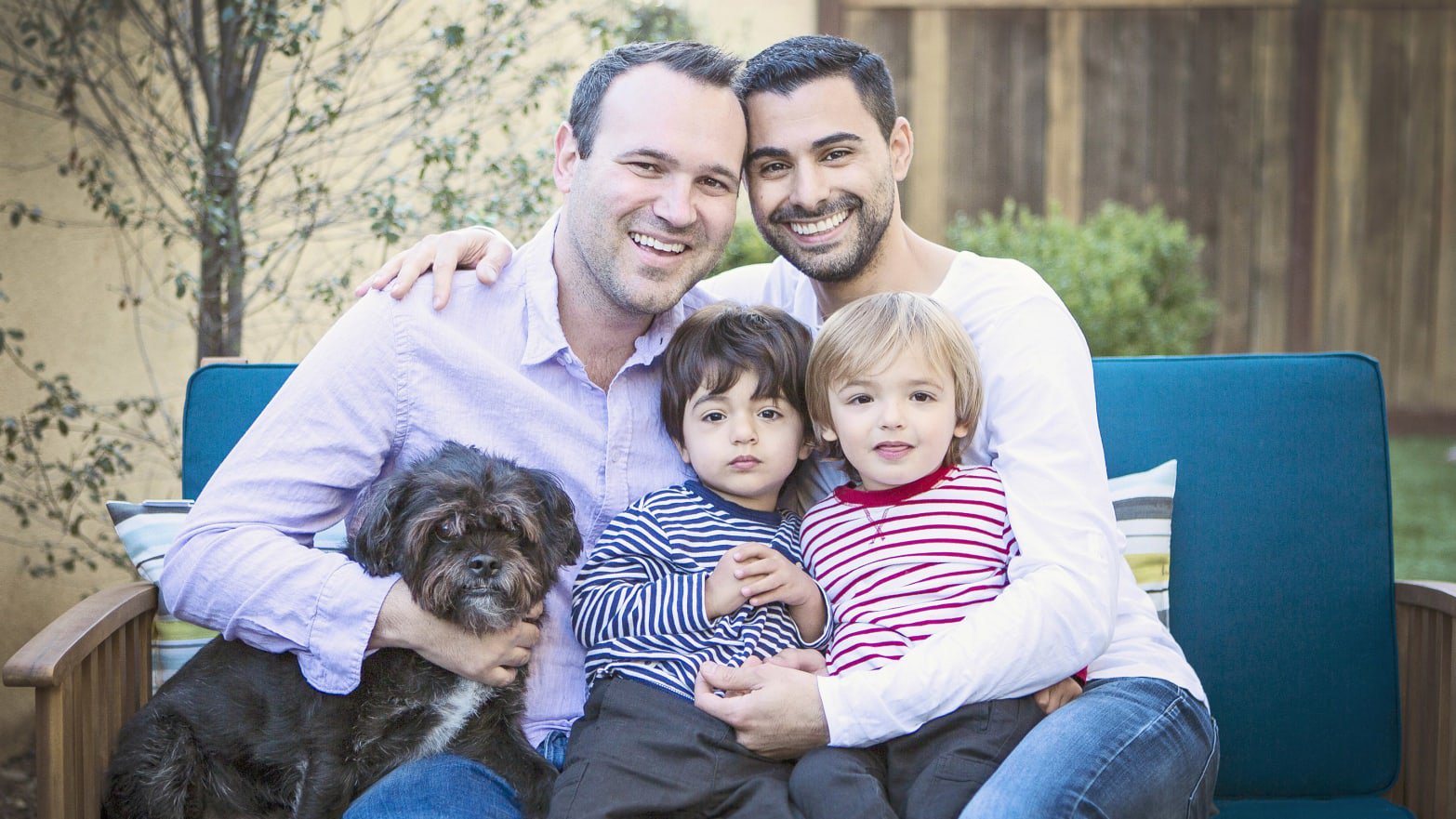Andrew and Elad Dvash-Banks have twin sons, born four minutes apart. The U.S. State Department has maintained that one is a U.S. citizen and one is not. The same-sex couple has been fighting the U.S. government in federal court for citizenship rights for their young child.
In February 2019, Judge John F. Walter of the U.S. District Court for the Central District of California ruled in Dvash-Banks v. Pompeothat the child, Ethan, is indeed a U.S. citizen because his parents were married at the time of his birth, and therefore the State Department misapplied the law.
The State Department is now appealing the District Court ruling to the Ninth Circuit Court of Appeals. The State Department has maintained that U.S. citizenship can only be passed along to a child that the U.S. citizen had a biological relationship with.
The Dvash-Banks Family
Andrew is a U.S. citizen, and Elad is Israeli. They were married in Canada in 2010. There, they had children through a gestational surrogate. Each father’s genetic material had fertilized one egg from an anonymous donor. Ethan shared genetic material with Elad, and Aiden with Andrew. The twins were born in 2016, and they were issued birth certificates listing Andrew and Elad as their parents.
Application at the U.S. Consulate in Toronto for a Consular Report of Birth Abroad
In 2016, the family made an appointment at the U.S. Consulate in Toronto to apply for a consular report of birth abroad (CRBA) and U.S. passport for each child.
A CRBA (Form FS-240, Consular Report of Birth Abroad of a Citizen of the United States of America) is an official document issued by the State Department certifying acquisition of citizenship for a child born outside of the United States.
Andrew and Elad were shocked at the conversation they had with the consular officer, they later told NPR News.
“She started off with, ‘Obviously the two of you had to use assisted reproduction in order to have your family…. Tell me more about that. Tell me about who is genetically related to who.”
The officer asked for DNA tests. Eventually, the State Department informed them that Aiden was granted a U.S. passport and Ethan was not.
The Law on Acquisition of Citizenship on Birth Abroad to a U.S. Citizen Parent
The Immigration and Nationality Act (“INA”) specifies the eligibility requirements for U.S. citizenship at birth. For children born abroad, these requirements differ for children born to married parents, who are subject to INA § 301 and children “born out of wedlock,” who are subject to INA § 309.
Section 301(g) provides, in part, that a person is a U.S. citizen if born outside the United States “of parents,” one of whom is a U.S. citizen who was physically present in the U.S. for at least 5 years (2 of which were after age 14) prior to the child’s birth.
Section 301 does not explicitly require a blood relationship between the U.S. citizen parent and the child. In contrast, § 309 does require a “blood relationship” for a child born out of wedlock. Nevertheless, the State Department’s internal guidance to its officers, called the Foreign Affairs Manual, requires a blood relationship in § 301 cases as well.
The District Court’s ruling called this interpretation “strained.” Indeed, under the State Department’s own policy, a gestational mother (who carries and gives birth to the child) need not have a genetic relationship with the child.
In other cases, the Ninth Circuit has held that no blood relationship is required. Scales v. INS was a case involving a child born abroad whose foreign national mother was married to a U.S. citizen, but whose genetic father was a third party. The court held that the child was not “born out of wedlock” and determined that under the statute no genetic relationship need be proven between the U.S. citizen father and the child. The court cited to a widespread family-law presumption that the husband is the father of a child born to his wife.
Similarly, Solis-Espinoza v. Gonzalez involved a child born to two foreign nationals. The father had an extramarital affair with the natural mother and was married to a U.S. citizen. The court held that the resulting child was not “born out of wedlock” because of the presumption of parentage for children born to married couples. So no blood relationship to the U.S. citizen mother was required to establish citizenship.
In Dvash-Banks v. Pompeo, the District Court reasoned that the facts of the case are indistinguishable from Scales and Solis-Espinoza so the result must be the same.
My Thoughts
The District Court ruling appears to be a straight-forward application of settled law in the Ninth Circuit, so I would expect the Ninth Circuit to affirm. Nevertheless, the Ninth Circuit’s rulings in Scales and Solis-Espinoza are not uniformly consistent with other circuits. As a result, the Trump Administration may be planning to ask the Supreme Court to overrule the Ninth Circuit. That could be an uphill battle for the Trump Administration since, as mentioned above, the State Department’s own internal policy doesn’t always require a blood relationship under § 301.
Additional Sources
Merrit Kennedy, Judge Rules Against State Department in Same-Sex Couple’s Citizenship Lawsuit, NPR (Feb. 22, 2019)
Tim Fitzsimons, U.S. Appeals Ruling That Granted Gay Couple’s Son Citizenship, NBC News (May 8, 2019)
Gary Chodorow, Guide to Acquisition of Citizenship by Birth Abroad (May 1, 2019)

Leave a Reply